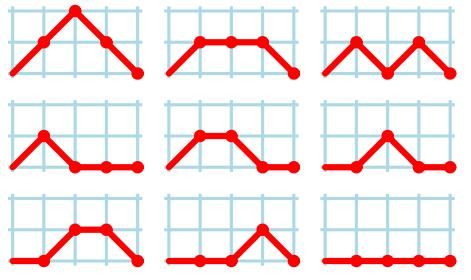HDU 3723 Delta Wave
题目链接:http://acm.hdu.edu.cn/showproblem.php?pid=3723
Delta Wave
Time Limit: 6000/3000 MS (Java/Others) Memory Limit: 32768/32768 K (Java/Others)
Total Submission(s): 1069 Accepted Submission(s): 341
Problem Description
A delta wave is a high amplitude brain wave in humans with a frequency of 1 – 4 hertz which can be recorded with an electroencephalogram (EEG) and is usually associated with slow-wave sleep (SWS).
-- from Wikipedia
The researchers have discovered a new kind of species called "otaku", whose brain waves are rather strange. The delta wave of an otaku's brain can be approximated by a polygonal line in the 2D coordinate system. The line is a route from point (0, 0) to (N, 0), and it is allowed to move only to the right (up, down or straight) at every step. And during the whole moving, it is not allowed to dip below the y = 0 axis.
For example, there are the 9 kinds of delta waves for N = 4:

Given N, you are requested to find out how many kinds of different delta waves of otaku.
-- from Wikipedia
The researchers have discovered a new kind of species called "otaku", whose brain waves are rather strange. The delta wave of an otaku's brain can be approximated by a polygonal line in the 2D coordinate system. The line is a route from point (0, 0) to (N, 0), and it is allowed to move only to the right (up, down or straight) at every step. And during the whole moving, it is not allowed to dip below the y = 0 axis.
For example, there are the 9 kinds of delta waves for N = 4:

Given N, you are requested to find out how many kinds of different delta waves of otaku.
Input
There are no more than 20 test cases. There is only one line for each case, containing an integer N (2 < N <= 10000)
Output
Output one line for each test case. For the answer may be quite huge, you need only output the answer module 10100.
Sample Input
3 4
Sample Output
4 9
Source
2010 Asia Tianjin Regional Contest
Recommend
zhouzeyong
思路:坐标是(0,0)和(N,0),所以向上了几次,就要向下几次。单独考虑向上向下,就是卡特兰数。考虑哪些上哪些下,就是排列组合。
卡特兰数公式:c[n] = c(2n, n) / (n + 1)。
如果上升了 k 次,那么就必须下降 k 次,所以方案数:a[k] = c(n, 2k) * c(2k, k) / (k + 1),k = 0,1,...,n/2。
因此,总方案数sum[n] = a[0] + a[1] + a[2] + ……+ a[k] (k <= n/2),且a[0] = 1(只有一个水平的)。
继续化简:a[k] = c(n, 2k) * c(2k, k) / (k + 1) 与 a[k - 1] = c(n, 2k - 2) * c(2k - 2, k - 1) / k,推出下列公式,
a[k] = a[k-1] * (n - 2 * k + 1) * (n - 2 * k + 2) / (k * (k + 1))。数据太大了,所以用Java实现比较方便。
附上AC代码:
import java.util.Scanner;
import java.math.BigInteger;
import java.util.Arrays;
import java.math.BigDecimal;
public class Main{
public static void main(String args[]){
Scanner in = new Scanner(System.in);
while (in.hasNext()){
int n = in.nextInt();
BigInteger ans = BigInteger.ONE;
BigInteger t = BigInteger.ONE;
for (int i=1; i<=n/2; ++i){
t = t.multiply(BigInteger.valueOf((n-2*i+1)*(n-2*i+2))).divide(BigInteger.valueOf(i*(i+1)));
ans = ans.add(t);
}
System.out.println(ans.mod(BigInteger.TEN.pow(100)));
}
in.close();
}
}